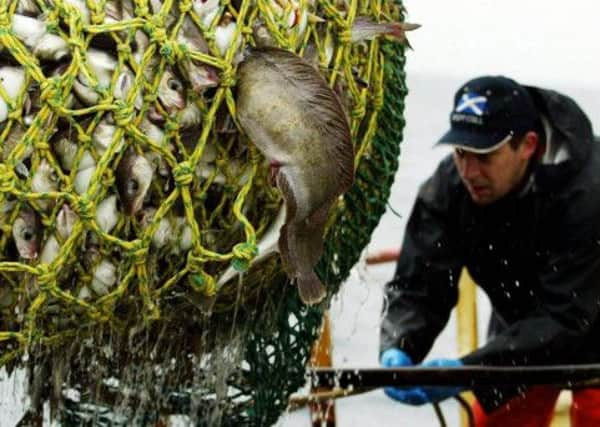Flawed rules threaten Scottish fishing


It would be better, perhaps, if Shetland was part of Africa, with some quirk of history delivering these islands at Siberian and Alaskan latitudes to the care of an emerging tropical nation.
Like so many island communities in the tropics, we have depended on the sea and a healthy marine ecosystem for more generations than anyone can count. Like them, our history and culture is steeped in the oceans. Folklore, poetry, music and art are drenched in loss and longing, together with a mix of fear and awe of the elements. Traditionally, Shetlanders were highly resilient and extremely vulnerable, a paradox that is well understood in all the world’s wild places.
Advertisement
Hide AdAdvertisement
Hide AdSuppose, for a minute, that the quirk happened and we were African, or part of some Pacific nation. Shetland’s economic success would have attracted considerable attention, with fishing combining with the oil and gas industry to ensure full employment and dynamic growth even through the recent recession.
More fundamentally, the ability of a community of barely 23,000 souls to develop an indigenous fish catching and aquaculture sector, with high-tech ocean-going trawlers working in tandem with small, inshore vessels specialised in shellfish to draw a sustainable living from some of the most unforgiving seas on Earth, would have elicited at least some measure of admiration.
Contrasting with more mixed fortunes elsewhere, Shetland’s waters are highly productive, and scientists as well as fishermen will tell you that in this part of the world at least, catches of such species as mackerel, cod and haddock are more than sustainable. A severe shakeout 15 years ago has left the local fishing industry in an enviable position, and heavy investment by the Shetland Islands Council, Lerwick Port Authority and local banks alongside the fishermen themselves has repaid itself many times over. Shetland now lands more fish than England and Wales combined.
So if it all works so well, why be African?
Because communities like ours, in Africa and elsewhere in the developing world, are – quite rightly – defended by the environmental activists who have gained so much influence over the European Parliament and domestic politicians.
One of the main themes of environmental protection in recent decades has been an emphasis on local management, with a robust defence of the rights of traditional communities to manage ecosystems they have understood for generations. This is a highly welcome development, and a healthy counterweight to the short-term profit motives liable to drive multinational companies.
This brings us to a fine irony. It was an extremely well-funded green lobby that rammed unworkable legislation on discarding [unwanted fish] at sea through the European Parliament last year. While nobody would dispute that discarding at sea is a terrible waste, replacing it with discarding on land is not a solution. Especially as it could bankrupt the greater part of the Scottish fishing fleet.
The fact is that these flawed rules are a particularly serious threat to communities such as Shetland, with its 4,000 years of maritime history, sustainable fisheries and a diverse fishing fleet owned almost entirely by local, shareholder crews.
Bizarrely, the discards ban is a particular threat to us because we have thriving and diverse fish stocks. The ban is simply not designed to cope with that situation. The problem is that fishing quotas are ultimately based on science, and the science is badly lagging trends in the ocean. When the marine ecosystem is as vigorous as it is around Shetland, quotas and fish stocks are almost bound to be seriously mismatched.
Advertisement
Hide AdAdvertisement
Hide AdDiscarding at sea used to be the only escape valve for this shortcoming. Banning the practice without changing the way quotas are set and managed is a daft thing to do – like tackling air pollution by stuffing corks into car exhaust pipes. In Shetland, as in the rest of Scotland, the fishing industry has been keen to explore alternative management systems that could be compatible with avoiding discards. Changing the way car engines work, as it were, so there is no exhaust problem. But this is not the path the green lobby chose in wining and dining lawmakers in Brussels; Shetland and other fishing communities have been left with a potentially catastrophic problem and precious little time to deal with it.
The discards ban was supposed to be the European green lobby’s finest hour. But presumably it would be galling to even the most hardened eco-warriors to find that they had wiped out a community in European waters that they would have eagerly defended had it been somewhere else – and replaced its indigenous, sustainable fishing industry with massive trawlers owned by international conglomerates.
It is late in the day, but not too late, for environmentalists and others who fought for a discard ban to consider what they have done. Why insist on legislation that could have such a perverse – and ultimately anti-green – impact? We all want an end to discards. For fishermen, they are a terrible waste of wild resources, fuel and money. But a blanket ban does not remedy the shortcomings of a system that results in discarding in the first place, and we should all be working on that rather than destroying the sorts of communities you would most want to survive.
• Simon Collins is executive officer of the Shetland Fishermen’s Association
SEE ALSO